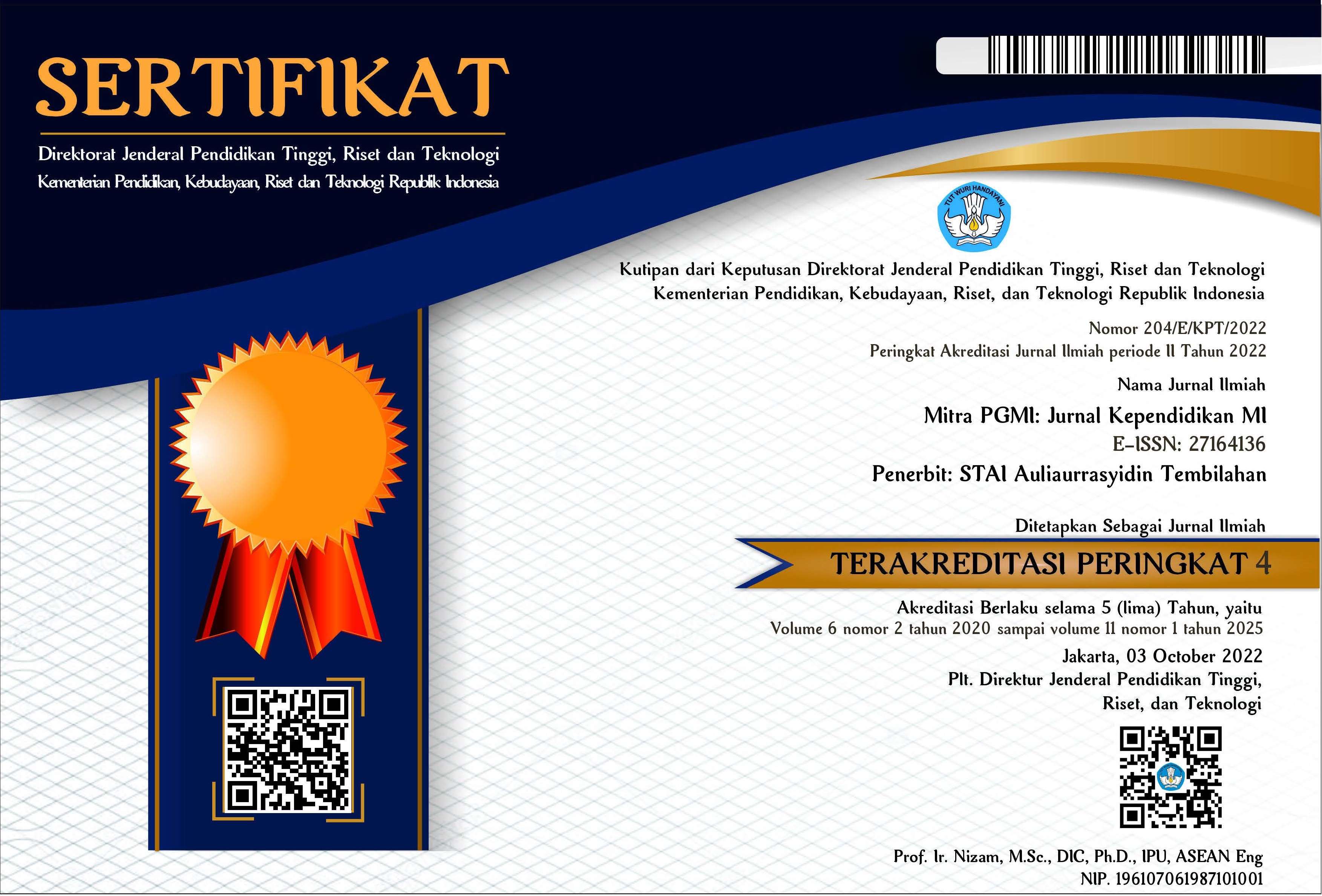Pendidik dalam Perspektif Al-Quran dan Pendidikan Islam
DOI:
https://doi.org/10.46963/mpgmi.v7i1.204Keywords:
Educator, Al-Quran, Islamic educationAbstract
This article discussed educators from the perspective of the Al-Quran and Islamic education. Educators are an important element in the Islamic education system. Educators are determinants of the intellectual and moral success of students. So it is interesting to ask how educators in the perspective of the Al-Quran and Islamic education. To answer these research questions, this study used library research and descriptive-analysis methods. The results of this study revealed that the subject of educators according to the Al-Quran is very diverse and forms a hierarchy, Allah, Rasulullah, parents, and teachers. Whereas the predicate that is usually carried by an educator in the Islamic education tradition is Ustadz, Mu'allim, Mursyid, Murabbi, Mudarris, and Mu'addib. Each of these names has almost the same meaning but has its own definitions and characteristics.
Downloads
References
Ali, M. (2017). Hakikat Pendidik Dalam Pendidikan Islam. Tarbawiyah: Jurnal Ilmiah Pendidikan, 11(01), 82-97. Retrieved from https://e-journal.metrouniv.ac.id/index.php/tarbawiyah/article/view/361.
Aslamiyah, S. (2013). Pendidik dalam perspektif pendidikan Islam. Al Hikmah: Jurnal Studi Keislaman, 3(2), 2. https://doi.org/10.36835/hjsk.v3i2.371.
Depdiknas. (2009). Kurikulum Tingkat Satuan Pendidikan. Jakarta: Pusat Kurikulum Balitbang Depdiknas.
Drost, J.I.G.M. (2008). Sekolah: Mengajar atau Mendidik? Yogyakarta: Kanasius.
Fahmi, A. H. (1979). Sejarah dan Filsafat Pendidikan Islam. Jakarta: Bulan Bintang.
al-Ghazali. (1996). Ihya’ Ulum al-Din. Kairo: Dar Al-Ihya Al-Kutub Al-Arabiyah.
Ihsan, A. H., & Ihsan, F. (2001). Filsafat Pendidikan Islam. Bandung: Pustaka Setia.
Langgulung, H. (1991). Kreativitas dan Pendidikan Islam: Analisis Psikologi dan Falsafah. Jakarta: Pustaka Al-Husna.
Lubis, S. A. (2006). Dasar-Dasar Kependidikan. Bandung: Cita Pustaka Media.
Maisyaroh, M. (2019). Hakikat Pendidik dalam Perspektif Falsafah Pendidikan Islami. Jurnal Pendidikan Agama Islam Al-Thariqah, 4(2), 1–9. https://doi.org/10.25299/al-thariqah.2019.vol4(2).4079.
Al-Maraghi, A. M. (1989). Tafsir Al-Maraghi. Bairut: Dar al-Fiqh.
Marpuah, M. (2017). Kriteria Pendidikan dalam Sudut Pandang al-Qur'an Surat al-Muddatstir Ayat 1-7. Syntax Literate; Jurnal Ilmiah Indonesia, 2(11), 91–105. Retrieved from http://jurnal.syntaxliterate.co.id/index.php/syntax-literate/article/view/260.
Maulida, A. (2018). Kompetensi Pendidik Dalam Perspektif M. Natsir (Studi Analitis Pemikiran Pendidikan M. Natsir dalam “Fiqhud Dakwah”). Al-Fikri: Jurnal Studi Dan Penelitian Pendidikan Islam, 1(2), 39–46. http://dx.doi.org/10.30659/jspi.v1i2.3207.
Al-Mubarakfuri. (1979). Tuhfah Al-Ahwadzi Syarh Jami’ al-Tirmidzi. Bairut: Dar al-Fikr.
Muhadjir, N. (2000). Ilmu pendidikan dan perubahan sosial. Yogyakarta: Rake Sarasin.
Muhaimin. (2005). Pengembangan Kurikulum Pendidikan Agama Islam di Sekolah, Madrasah, dan Perguruan Tinggi. Jakarta: Raja Grafindo Perkasa.
Muhajir, A. (2000). Ilmu Pendidikan dan Perubahan Sosial: Teori Pendidikan Pelaku Sosial Kreatif. Yogyakarta: Rake Sarasin.
Mujib, A. (2008). Ilmu Pendidikan Islam. Jakarta: Kencana Prenada Media.
Al-Nahlawi. (1996). Usul Al-Tarbiyah al-Islamiyah Wa Asalibuha Fi al-Bait Wa al-Madrasah Wa al-Mujtama’. Bairut: Dar al-Fikr.
Nata, Abudin. (1997). Filsafat Pendidikan Islam I (1st ed.). Jakarta: Logos Wacana Ilmu.
Nata, Abudin. (2016). Pendidikan dalam Perspektif Al-Qur’an. Jakarta: Prenada Media.
Ramayulis. (2005). Metodologi Pendidikan Agama. Jakarta: Kalam Mulia.
Ramayulis. (2009). Filsafat Pendidikan Islam. Jakarta: Kalam Mulia.
Ramayulis, & Nizar. (2010). Filsafat Pendidikan Islam. Jakarta: Kalam Mulia.
Rivai, V. (2004). Manajemen Sumber Daya Manusia untuk Perusahaan. Jakarta: Raja Grafindo Perkasa.
Sada, H. J. (2015). Pendidik Dalam Perspektif Al-Qur’an. Al-Tadzkiyyah, 6(1), 93–105.
Shihab, M. Q. (1994). Studi Kritis Tafsir Al-Manar. Bandung: Pustaka Hidayah.
Subagyo. (2002). Pendidikan Kewarganegaraan III. Semarang: IKIP Semarang Press.
Sulaiman, F.H. (1990). Pemikiran Pendidikan tentang Al-Ghazali. Yogyakarta: Pustaka Pelajar.
Suyudi, M. (2014). Filsafat Pendidikan Islam: Kajian filosofis dan pemikiran pendidikan Islam.
Tafsir, A. (1992). Ilmu pendidikan dalam perspektif Islam. Remaja Rosdakarya.
Tim Redaksi. (2005). Kamus Besar Bahasa Indonesia. Jakarta: Balai Pustaka.
Uhbiyati, N. (1997). Ilmu Pendidikan Islam I. Bandung: Pustaka Setia.
Downloads
Published
Issue
Section
License
Copyright (c) 2021 Juarman Juarman, Arivaie Rahman, Sri Erdawati

This work is licensed under a Creative Commons Attribution-ShareAlike 4.0 International License.
Authors who publish with this journal agree to the following terms:
1. Copyright on any article is retained by the author(s).
2. The author grants the journal, right of first publication with the work simultaneously licensed under a Creative Commons Attribution shareAlike 4.0 International License that allows others to share the work with an acknowledgment of the work’s authorship and initial publication in this journal.
3. Authors are able to enter into separate, additional contractual arrangements for the non-exclusive distribution of the journal’s published version of the work (e.g., post it to an institutional repository or publish it in a book), with an acknowledgment of its initial publication in this journal.
4. Authors are permitted and encouraged to post their work online (e.g., in institutional repositories or on their website) prior to and during the submission process, as it can lead to productive exchanges, as well as earlier and greater citation of published work.
5. The article and any associated published material is distributed under the Creative Commons Attribution-ShareAlike 4.0 International License








2.png)


